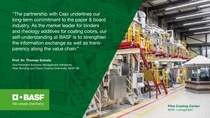MyIndustryWorld
BASF joins Cepi, the European association representing the paper industry
Read the joint interview between Jori Ringman, Cepi Director General & Prof. Dr. Thomas Schiele, Vice President Business Management Adhesives, Fiber Bonding and Paper Coating Chemicals EMEA.
Jori, what does it mean to be a Cepi partner?
Our partnership program is open to established suppliers of the pulp, paper and cardboard industry, namely all suppliers of machines, chemicals, energy and suppliers, all directly involved in paper manufacturing. The program was set up in response to the complexity of the value chain and the need for expertise on relevant issues. It serves as a forum for discussion and the exchange of technical information in the policy context of the European Union. Our current partners are OMYA, Voith, Valmet, Buckman and Afry.
I am delighted to welcome BASF as a new partner and all the expertise it brings with it. We have cooperated with BASF in the past and this will further strengthen cooperation along the pulp and paper value chain. Cepi has since long been driving value chain cooperation of all kinds. This approach, which now includes BASF, reinforces our position as a key player in the process of defining a new, greener and more circular industrial model for the EU.
Thomas, what made you decide to join Cepi as a partner?
The partnership with Cepi is a further component of our long-term commitment to the paper & board industry.
As the market leader for binders and rheology additives for coating colors, our self-understanding at BASF is to actively contribute towards the goals of the industry and to strengthen the information exchange as well as transparency along the value chain.

We see that the rate of change is accelerating, especially driven by the EU’s Green Deal. New regulations are constantly popping up and there is an ever-growing demand for sustainable solutions.
This adds further complexity. No value chain player can handle these challenges alone by staying in its own backyard. Instead, we need collaboration, we need to share information and coordinate our activities in order to overcome hurdles and transform them into growth opportunities for the industry.
The strategy is clear: new sustainable solutions are required and the speed of innovation needs to be increased.
We are already working on these issues and there will be more news forthcoming in the upcoming months.
Jori, speaking of the EU Green Deal, would you explain what it is and its importance in the context of Cepi partnerships?
The Green Deal is the flagship for EU’s climate change regulation. It is based on legally binding targets that require the European Union to reach climate neutrality by 2050, with the intermediate goal of reducing emissions by 55% by 2030, both of which are supported by the European paper industry. Unfortunately, this plan is not yet perfect as it fails to de-risk investments in decarbonization, even though crucial investment decisions need to happen right now if we want to reach the EU’s climate goals.
However, it is not just about decarbonising activities, but also about creating a new circular bioeconomy using sustainable bio-based materials. The systemic transformation we need for this requires dialogue and collaboration across the value chain. First of all, we have to gain a better understanding of what each of us needs during this transformation. And the stronger our network, and the more players that actively live the change, the more successful we will be as an industry.
The Green Deal further aims to achieve a “greener industry” and the “elimination of pollution”, both of which are relevant for our chemical suppliers.
Thomas, how well does this reflect BASF’s own strategy?
BASF is at the forefront of the sustainability movement in the chemical industry. It has very ambitious targets and many projects are already underway. The mid- to long-term target is to introduce a truly biobased chemistry based on renewable and recycled feedstocks. In the short-term, production sites will be gradually switched over to renewable energy and efficiency measures are being implemented.
In terms of its products, BASF already now offers the possibility to significantly reduce the carbon footprint of its products (PCF) via the Biomass balance approach or ChemCycling™. For such solutions in particular, we see an ever-increasing demand. First major customers have already announced that they are planning to adjust their purchasing strategies with the clear target of sourcing more sustainably and reducing PCFs. Of course, this is only the beginning, more work needs to be done.
Truly sustainable solutions can only be implemented if all of the players involved in the process pull together. We are talking about all of the suppliers of the paper industry, the paper producers, the converters, the brand owners and retailers as well as the recycling industry. Cepi and BASF share here the same understanding. It was only logical to finally join as an official partner.
Thomas, following up on what you just said, how important is it for BASF paper coatings to align with the paper sector, and in which areas is this alignment most needed?
As I just outlined, sustainability is one part of the equation and one that is truly at the very heart of our DNA.
Regulatory considerations are another. New chemical regulations and directives driven by the EU’s Chemicals Strategy for Sustainability (CSS) are entering into force, often within very tight time frames. The key factors here are transparency and the assessment of their impact early on in the process.
Industry associations often do not have the necessary chemical expertise to do this. This is where I believe that we can add value as a Cepi partner. The Pulp and Paper Value Chain Information System (P&P VIS), which was established to facilitate an exchange of chemical information along the value chain, demonstrates what can be achieved when the industry works together. Now it is up to all of us to leverage our resources and know-how to bring the industry forward together.
Related topics
Contact us
Not found what you were looking for? Reach out to us for assistance.
Subscribe to our News-Service
Don’t miss the latest news on web seminars, sustainability, regulatory and product innovations.




.jpg)